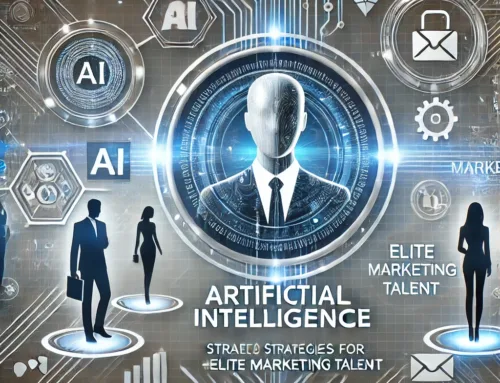Artificial intelligence (AI) has rapidly transformed from a futuristic concept to a crucial component of modern business operations. AI tech companies are at the forefront of this revolution, developing innovative solutions that are reshaping industries. However, as the demand for AI technologies grows, so does the need for top-tier talent to drive these innovations. Hiring the right professionals in such a competitive and specialized field presents unique challenges. This article provides a comprehensive guide to the best practices that AI tech companies can adopt to enhance their hiring processes, ensuring they attract and retain the best talent in the industry.
Understanding the Landscape of AI Hiring
Before delving into best practices, it’s important to understand the current landscape of AI hiring. The AI industry is marked by rapid technological advancements, creating a high demand for specialized skills in areas like machine learning, natural language processing (NLP), robotics, and data science. According to a report by Gartner, AI is expected to create 2.3 million jobs by 2025, but the demand for AI talent already far outstrips supply . This talent shortage has made hiring for AI positions extremely competitive, with companies vying for a limited pool of qualified candidates.
In addition to technical expertise, AI roles often require interdisciplinary knowledge, combining elements of computer science, mathematics, engineering, and domain-specific knowledge (e.g., healthcare, finance). Furthermore, the rapidly evolving nature of AI means that professionals in this field must be committed to continuous learning and staying up-to-date with the latest advancements.
Given these challenges, AI tech companies must adopt strategic hiring practices to secure the talent necessary for their continued growth and success.
Best Practices for AI Hiring
1. Crafting Compelling Job Descriptions
A well-crafted job description is the first step in attracting the right candidates. In the AI industry, job descriptions should go beyond listing technical skills; they should clearly communicate the role’s impact on the company’s goals and the broader industry. Here are some key elements to include:
- Clear Role Definition: Specify the primary responsibilities and expectations for the role. For example, if you’re hiring a machine learning engineer, outline the specific types of projects they will work on, such as developing predictive models or optimizing algorithms.
- Required Skills and Qualifications: Detail the essential technical skills (e.g., proficiency in Python, experience with TensorFlow) as well as soft skills like problem-solving and collaboration. It’s also important to distinguish between “must-have” and “nice-to-have” skills to avoid deterring potentially strong candidates.
- Company Mission and Culture: Highlight your company’s mission and values, particularly how they relate to AI. For instance, if your company is focused on ethical AI development, emphasize this in the job description to attract candidates who share these values.
- Opportunities for Growth: Given the dynamic nature of AI, top talent is often looking for opportunities to grow and learn. Mention opportunities for professional development, such as access to cutting-edge projects, ongoing training, or the potential to lead new initiatives.
- Compensation and Benefits: While it’s common to include a general statement about competitive salaries, providing a more detailed overview of the benefits—like equity options, remote work flexibility, and health benefits—can make your job description stand out.
A compelling job description not only attracts qualified candidates but also sets clear expectations, which can reduce turnover by ensuring that new hires are well-aligned with the role and company culture from the outset.
2. Leveraging Specialized Recruitment Channels
General job boards may not yield the best results when recruiting for AI roles. Instead, AI tech companies should consider leveraging specialized recruitment channels that cater specifically to tech professionals. Some effective strategies include:
- Niche Job Boards: Platforms like Stack Overflow, Kaggle, and AI-specific sites such as ai-jobs.net are frequented by professionals in the AI community. Posting on these platforms increases the likelihood of reaching candidates with the right skills and experience.
- Industry Conferences and Hackathons: Participating in AI conferences, workshops, and hackathons can be a great way to meet potential candidates. These events attract top talent who are passionate about AI and eager to engage with cutting-edge developments in the field.
- University Partnerships: Establishing partnerships with universities that offer strong AI programs can help companies tap into a pipeline of emerging talent. Consider offering internships, sponsoring research projects, or participating in campus recruitment events.
- Professional Networks: Leveraging professional networks like LinkedIn, GitHub, and specialized AI forums can help identify candidates who may not be actively seeking new opportunities but are open to the right offer. Engaging with these communities by sharing company news, thought leadership articles, and job openings can also enhance your brand’s visibility among AI professionals.
By focusing on these specialized channels, AI tech companies can more effectively reach the talent pool most relevant to their needs.
3. Implementing Data-Driven Recruitment Strategies
Data-driven recruitment involves using analytics and metrics to inform hiring decisions, making the process more objective and efficient. AI tech companies, in particular, can benefit from this approach due to the technical nature of the roles they are filling. Here’s how to implement data-driven recruitment:
- Applicant Tracking Systems (ATS): Utilize an ATS to manage the recruitment process. These systems can track applicants, automate resume screening, and provide insights into which recruitment channels are yielding the best candidates.
- Predictive Analytics: Predictive analytics can be used to assess the potential success of candidates based on historical data. For example, by analyzing the backgrounds of current top performers, companies can identify patterns that indicate a higher likelihood of success in similar roles.
- Skill Assessments: Incorporate technical assessments and coding challenges into the hiring process. These assessments provide objective data on a candidate’s abilities and can be tailored to simulate the types of tasks they would encounter on the job.
- Hiring Metrics: Track key metrics such as time-to-hire, cost-per-hire, and candidate drop-off rates to identify bottlenecks in the recruitment process and areas for improvement.
Data-driven recruitment not only enhances the efficiency of the hiring process but also helps reduce bias by focusing on objective criteria. This approach can lead to better hiring outcomes and a more diverse workforce.
4. Building a Strong Employer Brand
A strong employer brand is crucial for attracting top AI talent, especially in a competitive market. Your employer brand is the perception of your company as a place to work, and it plays a significant role in influencing candidates’ decisions to apply for or accept a job. To build a compelling employer brand:
- Highlight Company Culture: Showcase your company’s culture, emphasizing aspects that resonate with AI professionals, such as innovation, collaboration, and continuous learning. Use social media, blogs, and videos to share stories from current employees about what makes your company a great place to work.
- Promote Success Stories: Publicize successful AI projects and innovations developed by your team. This not only positions your company as a leader in AI but also attracts candidates who want to work on impactful projects.
- Engage in Thought Leadership: Contribute to industry discussions by publishing white papers, participating in webinars, and speaking at conferences. Thought leadership helps establish your company as an authority in AI, making it more attractive to top talent.
- Employee Advocacy: Encourage employees to share their positive experiences on platforms like LinkedIn. Authentic testimonials from current employees can be incredibly persuasive for potential hires.
- Social Responsibility: Highlight your company’s commitment to ethical AI practices, diversity, and inclusion. Today’s job seekers, particularly in the tech industry, are increasingly looking for employers who are aligned with their values.
Building a strong employer brand takes time, but it’s an investment that can significantly enhance your ability to attract and retain top talent.
5. Streamlining the Interview Process
The interview process is a critical component of hiring, especially for AI roles where technical expertise and problem-solving abilities are paramount. However, a lengthy or cumbersome interview process can deter top candidates. To streamline the interview process:
- Structured Interviews: Develop a structured interview process that includes a mix of technical and behavioral questions. Structured interviews help ensure that all candidates are evaluated consistently and fairly. For technical roles, consider incorporating coding challenges or case studies that simulate real-world scenarios.
- Interview Panels: Use panel interviews to assess candidates from multiple perspectives. Include representatives from different departments (e.g., engineering, data science, and product management) to evaluate the candidate’s fit across the organization.
- Timely Feedback: Provide candidates with timely feedback throughout the interview process. Delays in communication can lead to candidates losing interest or accepting offers from other companies.
- Candidate Experience: Focus on creating a positive candidate experience by being transparent about the process, providing clear instructions for technical assessments, and ensuring that interviews are conducted professionally and respectfully.
A streamlined interview process not only improves the candidate experience but also increases the likelihood of securing top talent before they are snapped up by competitors.
6. Offering Competitive Compensation and Benefits
In the highly competitive AI job market, offering attractive compensation packages is essential to attracting and retaining top talent. However, compensation in the AI industry goes beyond salary. Here’s what to consider when crafting your compensation packages:
- Market-Competitive Salaries: Conduct regular market research to ensure that your salaries are competitive. Compensation should reflect the candidate’s level of expertise, the complexity of the role, and the current market demand for AI skills.
- Equity and Bonuses: Offer equity options or performance-based bonuses to align the interests of employees with the long-term success of the company. These incentives can be particularly attractive to candidates who are looking to share in the company’s growth.
- Flexible Work Arrangements: Flexibility is increasingly important to today’s workforce. Offer options for remote work, flexible hours, and paid time off. Flexible work arrangements can be a significant differentiator in attracting top talent, especially in the tech industry.
- Professional Development: Provide opportunities for ongoing learning and development, such as access to online courses, certifications, and industry conferences. Investing in employees’ professional growth not only helps retain talent but also ensures that your team stays at the forefront of AI advancements.
- Comprehensive Benefits: Offer a comprehensive benefits package that includes health insurance, retirement plans, wellness programs, and other perks. Tailor your benefits to meet the needs of a diverse workforce, including options for mental health support, parental leave, and work-life balance initiatives.
By offering a well-rounded compensation package that goes beyond salary, AI tech companies can attract top candidates and build a loyal, motivated workforce.
7. Fostering Diversity and Inclusion
Diversity and inclusion are critical components of a successful hiring strategy, particularly in AI, where diverse perspectives can lead to more innovative solutions and reduce bias in AI systems. To foster diversity and inclusion in your hiring process:
- Inclusive Job Descriptions: Ensure that your job descriptions are free from biased language and appeal to a diverse range of candidates. Use gender-neutral language and emphasize your commitment to diversity and inclusion.
- Diverse Hiring Panels: Assemble diverse hiring panels to bring different perspectives to the interview process. This can help reduce unconscious bias and ensure that candidates are evaluated fairly.
- Diverse Talent Pipelines: Actively seek out diverse talent by partnering with organizations that focus on underrepresented groups in tech, such as Women in AI, Black in AI, and AI4ALL. Engage with communities and networks that support diversity in the tech industry.
- Bias-Free Screening: Implement blind screening techniques to reduce bias in the initial stages of the hiring process. For example, remove names and other identifying information from resumes during the initial review to focus solely on candidates’ skills and experience.
- Inclusive Culture: Foster an inclusive culture within your organization by promoting diversity, equity, and inclusion (DEI) initiatives. Ensure that all employees feel valued and supported, regardless of their background.
By prioritizing diversity and inclusion, AI tech companies can build stronger, more innovative teams and create a work environment where all employees can thrive.
Adapting to the Future of AI Hiring
The landscape of AI hiring is constantly evolving, driven by technological advancements, shifts in the job market, and changes in candidate expectations. To stay ahead, AI tech companies must be adaptable and proactive in their hiring strategies. Here are some trends to watch and adapt to:
1. The Growing Role of AI in Recruitment
AI is not only transforming industries but also the recruitment process itself. AI-driven tools can help companies automate candidate screening, identify top talent, and reduce bias in hiring decisions. For example, AI-powered platforms can analyze resumes, assess cultural fit, and even conduct initial interviews using chatbots.
As AI continues to advance, companies should explore how these tools can enhance their recruitment strategies. However, it’s important to use AI tools responsibly, ensuring that they complement rather than replace the human element in the hiring process.
2. The Rise of Remote and Hybrid Work
The shift to remote and hybrid work is likely to persist, even as the pandemic subsides. AI tech companies must continue to adapt their hiring processes to accommodate remote candidates, including conducting virtual interviews, onboarding remotely, and managing distributed teams.
To attract top talent, companies should emphasize their remote work policies and offer flexibility in where and how employees work. This not only expands the talent pool but also appeals to candidates who prioritize work-life balance.
3. Emphasizing Continuous Learning
The rapid pace of AI innovation means that continuous learning and upskilling will remain critical. AI tech companies should prioritize hiring candidates who demonstrate a commitment to lifelong learning and provide opportunities for employees to stay current with the latest advancements in AI.
By fostering a culture of continuous learning, companies can ensure that their workforce remains agile and capable of adapting to new challenges and opportunities.
Conclusion
Hiring top talent in the AI industry requires a strategic and multifaceted approach. By crafting compelling job descriptions, leveraging specialized recruitment channels, implementing data-driven strategies, and building a strong employer brand, AI tech companies can attract and retain the best candidates. Additionally, offering competitive compensation, fostering diversity and inclusion, and adapting to the evolving landscape of AI hiring are essential for staying ahead in a competitive market.
TreelineInc.com is committed to helping AI tech companies navigate the complexities of AI hiring. With our expertise in recruitment and deep understanding of the AI industry, we connect companies with the top talent they need to drive innovation and achieve their goals.
Ready to enhance your AI hiring strategy? Contact TreelineInc.com today for a consultation or to learn more about our specialized AI recruitment services. Visit our contact page to get started.
Share This Story, Choose Your Platform!
What our happy clients are saying
Contact Us for a Free Consultation
Tell us more about your business and how we can help.












